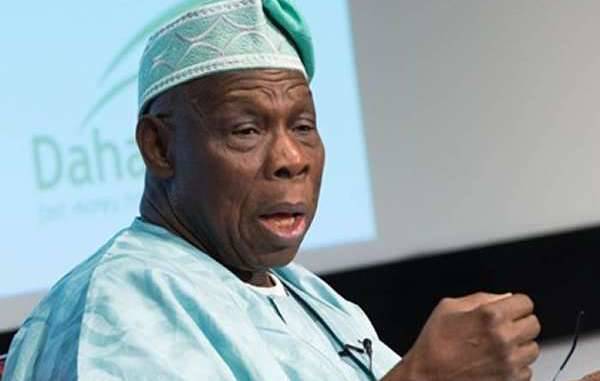Former President Obasanjo is back in the power loop and is set to play the role he has enjoyed playing since he left office in 2007: the game changer. On Thursday, October 11, he surprised everyone when he received his former vice-president Alhaji Atiku Abubakar in his house in Abeokuta and formerly endorsed the presidential candidate of PDP, the party that put both of them in power for eight years but which both men deserted in 2014.
You thought both were implacable political enemies? I thought so too. In my column for The Guardian and Blueprint October 12, I noted that for the first time since 2007, two men with whom Obasanjo is not well pleased, are running for president as APC and PDP presidential candidates respectively. Obasanjo had never hidden his disdain for Atiku’s presidential ambition. He had repeatedly dismissed it as possibly a pipe nightmare; not even a dream. In 2007, he said Atiku would become president over his dead body. He also said recently that God would not forgive him if he supported Atiku for president.
What has changed? Well, in politics as in diplomacy, as has been pointed out often, there are no permanent enemies; only permanent interests. Whatever interests drove Obasanjo to forgive and embrace Atiku may, for a long time, be the subject of conjectures.
In 2014/15, Buhari was Obasanjo’s man. He believed then he was the president we needed at that point in our national history. He does not think so any more. Last January the former president released a biting press statement in which he took Buhari to the cleaners. Given what he believed were the president’s glaring evidence of incompetence and his many sins against the people and the Nigerian state, he advised him not to seek re-election in 2019 but “to dismount from the horse” and “consider a deserved rest at this point in time and age.”
I noted in my column under reference: “Here we are. Buhari has defied Obasanjo to seek re-election. Atiku has defied Obasanjo to clinch the presidential nomination of his party. A win by either man would demystify Obasanjo’s hold on power in the country.” I then cautioned “against jumping into a hasty conclusion (because) politics is full of surprises. Either man could still win Obasanjo’s support and thus ensure his continued relevance in our national politics.”
And it has come to pass. Atiku has become Obasanjo’s man. He gushed about his former vice-president: “You have better reach nationally and internationally and that can translate to better management of foreign affairs. You are more accessible and less inflexible and more open to all parts of the country in many ways. As Pastor Bakare, one-time running mate of the incumbent president said, ‘You are a wazobia man.’ And that should help you in confronting the confrontable and shunning nepotism.”
He then took a dig at Buhari when he told Atiku: “And when you become Nigerian president which, insha-Allah, you will be, remember what we did together in government – we ran an administration by Nigerians for all Nigerians where merit and performance count(ed) more than blood relationship, friendship or kith and kin.”
Interesting times. The president’s men promptly reacted to this development by dismissing Obasanjo and Atiku, giving the impression, to use a well-known slang, that there is no shaking. They believe that Obasanjo’s endorsement of Atiku would make no difference to the political fortunes of the president. It seems to me they truly believe that the president has his re-election safely tucked away in his bag. Maybe, yes; maybe not. Self-assuredness often proves a fatal mistake in politics.
If I were one of the president’s men, I would not so handily dismiss this critical development. I thought the first thing they should do is to seek to understand why Obasanjo has thrown his weight behind Atiku. Let no one think the man is a light weight in our national politics. He has considerable weight. If he hated Atiku yesterday but loves him today, there must be some good reasons for his action. Obasanjo has a knack for being very calculating. Those reasons, whatever they are, are likely to be much more fundamental than the belief by the president’s men that he is merely playing politics. The nature of politics is such that there is no solid rock beneath anyone’s feet. In any case, Obasanjo gave a ten-month notice he would support someone, anyone, against Buhari in 2019. Refer to his January press statement.
It is important for the president and his men not to lose sight of two important points here. The first is that between Buhari and Atiku, the former is more vulnerable. An incumbent has the tough task of defending himself against a barrage of criticisms by his opponent or, indeed, opponents. The opposition would try to puncture achievements claimed by the incumbent. It could be nasty. As the Onitsha man would put it, it is not easy.
The second point is that Atiku and the other 17 or so presidential candidates are in the ring because they believe either that Buhari has failed or they can do a better job of leading the country than he has shown the capacity for so far. In 2015, he was the man we trusted. His opponents would dissect his three years plus in power and tell us why he is no longer to be trusted. His opponents would be on a relentless attack and Buhari would be on the defence. One against eighteen
At this point in the game, the one important question is: will Obasanjo be the game changer? Let no one tell you that Buhari and his men are not worried about Obasanjo’s intrusion, if that and how that question would be ultimately answered when we, the people, troop to the polls in February next year to let the world know our collective decision on Buhari, Atiku and the other 17 presidential candidates. We wait. We hope.

 Join Daily Trust WhatsApp Community For Quick Access To News and Happenings Around You.
Join Daily Trust WhatsApp Community For Quick Access To News and Happenings Around You.


